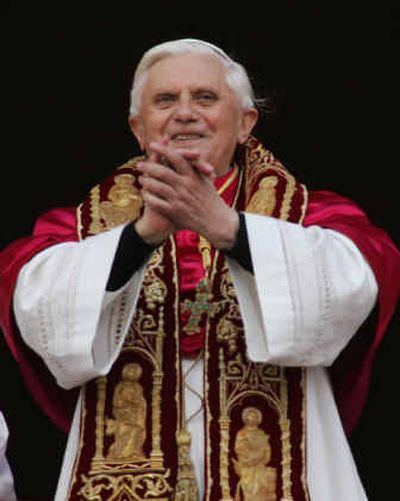Benedict XVI

VATICAN CITY – German Cardinal Joseph Ratzinger became Pope Benedict XVI on Tuesday, ascending to the Roman Catholic Church’s highest office a day after urging his fellow cardinal electors to choose a pontiff dedicated to tradition and conservatism.
Their selection of Ratzinger came as a surprise to some Vatican analysts as well as many among the thousands of well-wishers who ran cheering into St. Peter’s Square on Tuesday evening, when white smoke puffed from the chimney over the Sistine Chapel and signaled that the 265th pope would soon greet the world.
Benedict, who turned 78 on Saturday, is one of the oldest men ever to assume the papacy. He is a German who served briefly in the Hitler Youth during World War II. He is a staunch conservative who opposes efforts to broaden the church’s base, for example, by loosening prohibitions on marriage for priests, artificial contraception or ordination of women priests.
Benedict’s first words to the crowd were a tribute to the highly popular Pope John Paul II, who died April 2 after years of failing health. All but three of the 115 cardinals who elected the new pope were appointed by John Paul, which virtually assured that the new pope would follow the late pontiff’s traditionalist interpretation of church doctrine.
“Dear brothers and sisters, after the great Pope John Paul II, the cardinals have elected me, a simple, humble worker in the vineyard of the Lord,” said the new pontiff, who had served under John Paul since 1981.
He smiled as he offered words of self-deprecation, occasionally faltering as he spoke in Italian. “The fact that the Lord can work and act even with insufficient means consoles me, and above all I entrust myself to your prayers,” he said.
He appeared on the balcony of St. Peter’s Basilica after a long period of confusion caused by the emergence of grayish-white smoke from the chimney, made harder to distinguish by the dark clouds that hovered over the Vatican. Crowd members alternately cheered, then grew silent as the smoke continued to puff ambiguously. But there was no mistaking the signal when the giant bell atop the basilica began swaying, prompting a roar of approval long before the first peals became audible.
Heading into the conclave Monday morning, the College of Cardinals faced a difficult balancing act as they took into account the various pressures and political issues confronting the world’s 1.1 billion Catholics.
Some cardinals appeared open to the idea of selecting a pope from Latin America or Africa, two continents that account for the bulk of the world’s Catholics and the church’s fastest-growing base of support. Others, however, noted the need to shore up the church’s declining membership in Europe and the United States.
But perhaps most impressive for the cardinals was the indelible image of an estimated 4 million mourners flooding into Rome after John Paul’s death. The unprecedented turnout sent a strong message to the Vatican hierarchy that John Paul’s papacy had struck the right tone with the masses, and that his successor should follow in the same mold.
“He will continue to build on what John Paul has done,” said Father Joseph Khalil, a Maronite Catholic from Kisrwan, Lebanon. “If you look at Ratzinger in his writings and books, you can see he is a strict man. He doesn’t like to see the church’s traditions challenged.”
Lucas Meloni, a banker from Havana, Cuba, said he preferred the selection of a man with clear convictions over a potential waffler. “I had hoped it would be a Latin American pope, and this pope has a reputation as being a bit too tough-minded,” he said. “But I prefer him to the others, who gave me the impression that they were a little bit afraid, as if the weight of this job would be too much for them.”
As dean of the College of Cardinals and the man previously entrusted by John Paul as defender of church doctrine, Ratzinger was never ambiguous about his position on the key issues surrounding the church. He saw no room for compromise on the prohibition against birth control, even when other cardinals called for a relaxation on the use of condoms to help stop the spread of AIDS.
Despite pressure for the church to adapt its doctrine to the modern world in hopes of stanching the loss of followers in Europe, Ratzinger refused to budge. As the cardinals began their conclave Monday, he reminded them that church doctrine doesn’t bend to please the masses.
In his memoir, “The Salt of the Earth,” Ratzinger recalled growing up in the Alpine foothills of Bavaria as the son of a devout Catholic policeman. He made no secret of his forced induction, at age 14, into the Hitler Youth in 1941. He was excused from the service shortly afterward because he was already in training for the priesthood.
Later in his teens, he was drafted into a German Army anti-aircraft brigade that protected a BMW plant converted for wartime production. At age 18, he deserted the army shortly after completing basic training, only days before the Nazis surrendered and World War II ended in Europe. He was taken prisoner by U.S. troops.
Although several members of the crowd outside St. Peter’s Basilica expressed discomfort with his past, they were more dismayed by the message his selection sends for the future of the Catholic Church.
“I believe the church needs to listen to its members and what their needs and wants are,” said Amy Turnipseed, 21, a student from Bakersfield, Calif.